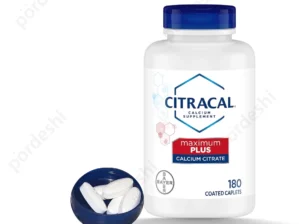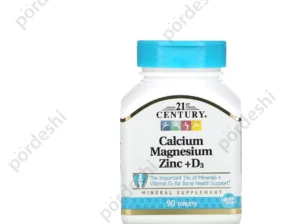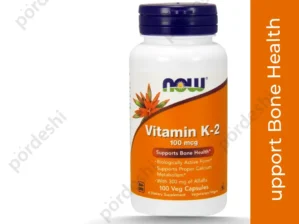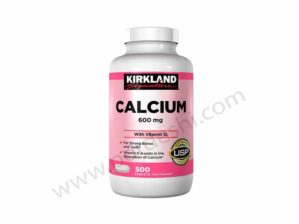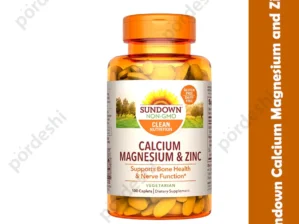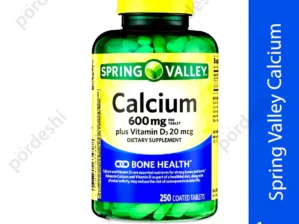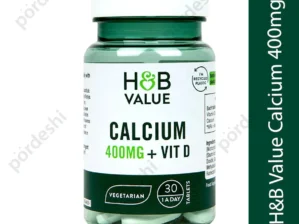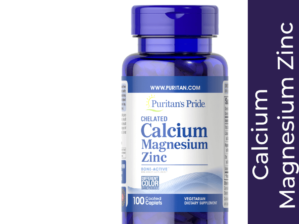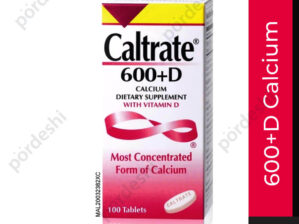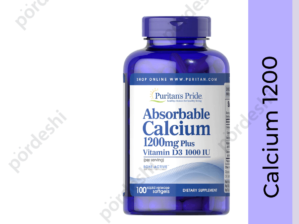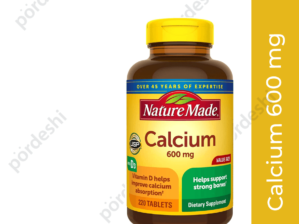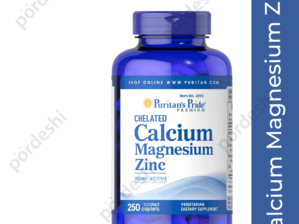Showing 1–12 of 14 results
Citracal Calcium Supplement Maximum Plus D3
Original price was: 3,800.00৳.3,649.00৳Current price is: 3,649.00৳.21st Century Calcium Magnesium Zinc Plus D3
Original price was: 1,800.00৳.1,749.00৳Current price is: 1,749.00৳.Kirkland Signature Calcium 600mg
Original price was: 4,000.00৳.3,897.00৳Current price is: 3,897.00৳.Sundown Calcium Magnesium and Zinc
Original price was: 1,800.00৳.1,699.00৳Current price is: 1,699.00৳.Caltrate 600+D Calcium
Original price was: 1,800.00৳.1,499.00৳Current price is: 1,499.00৳.Puritan’s Pride Absorbable Calcium
Original price was: 2,899.00৳.2,399.00৳Current price is: 2,399.00৳.Nature Made Calcium 600 mg Tablets
Original price was: 2,400.00৳.2,299.00৳Current price is: 2,299.00৳.The Essential Guide to Calcium Supplements for Health-Conscious Adults
In today’s health-conscious world, calcium supplements have emerged as a pivotal ally for maintaining optimal bone health and more. With a plethora of options on the market, it’s crucial for consumers, especially health-conscious adults, to make informed choices about their calcium intake. This comprehensive guide dives deep into the world of calcium supplements, exploring their significance, types, benefits, potential risks, and how to choose the right one for your needs.
Understanding Calcium Supplements
Calcium supplements are forms of calcium used for various conditions, primarily to address deficiencies in diet or specific health conditions like osteoporosis and rickets. While our bodies require a significant amount of calcium daily for healthy bones, muscles, and nerves, getting enough calcium solely from diet can be challenging for many.
Why Calcium is Vital
Calcium plays a critical role in maintaining bone density and overall skeletal health. It’s also essential for muscle function, nerve transmission, and vascular health. Adults typically need about 1 gram of calcium daily, a quota not always met by diet alone, hence the need for supplementation.
Who Should Consider Calcium Supplements
Individuals who might not get enough calcium from their diet, those with a diagnosed deficiency, or individuals at risk of bone diseases are prime candidates for calcium supplementation. This includes postmenopausal women, vegans, and those with lactose intolerance or certain digestive diseases.
How to Take Calcium Supplements
For optimal absorption, calcium intake should be spread throughout the day, with no more than 500 mg taken at once. Starting with a lower dose and gradually increasing can help minimize side effects like gas or constipation.
Types of Calcium Supplements
The most common types include calcium carbonate and calcium citrate, each with its advantages. Calcium carbonate, for instance, provides a higher elemental calcium content, while calcium citrate is more easily absorbed and can be taken without food.
Benefits of Using Calcium Supplements
Supplementing with calcium supports bone health, may reduce the risk of osteoporosis, and can aid in maintaining a healthy blood pressure. Additionally, it supports muscle and nerve functions, underscoring its importance across various bodily processes.
Risks and Side Effects
While beneficial, calcium supplements can have side effects, such as constipation, and in excess, may lead to kidney stones or interact with certain medications. It’s important to consult with a healthcare provider to tailor calcium intake to your specific needs.
Choosing the Right Calcium Supplement
Selecting the right supplement involves checking for “purified” or the United States Pharmacopeia (USP) symbol on the label, indicating quality and safety. It’s also wise to consider your dietary habits, any health conditions, and the form of calcium that best suits your body’s needs.
Ingredients to Pay Attention To
Beyond calcium, some supplements include added vitamins like D or magnesium to enhance absorption. Understanding the role of these additional ingredients can help optimize the benefits of your supplement.
Understanding Calcium, Calcium Citrate, Magnesium, vitamin D, and D3
Understanding the differences between calcium, calcium citrate, magnesium, vitamin D, and vitamin D3 is crucial for effective supplementation and achieving optimal bone health.
- Calcium is a mineral essential for bone and teeth health, as well as for nerve, muscle, and heart function. It’s the main component of bone tissue and is needed in large quantities in the diet.
- Calcium Citrate is a form of calcium that is more easily absorbed by the body, especially useful for individuals with lower stomach acid levels, like the elderly or those on certain medications. It can be taken with or without food, making it a versatile option.
- Magnesium works closely with calcium in the body to support bone health but also plays a pivotal role in over 300 enzymatic reactions, including energy production, muscle function, and the maintenance of heart rhythm.
- Vitamin D is a fat-soluble vitamin that is vital for the absorption of calcium and phosphorus from the stomach and for the functioning of these minerals in the body. It’s available in two main forms: D2 (ergocalciferol) and D3 (cholecalciferol).
- Vitamin D3 is the natural form of vitamin D that is produced in the skin from exposure to sunlight. It’s more effective than D2 in raising and maintaining overall vitamin D levels in the body, which is essential for calcium absorption.
In summary, while calcium and calcium citrate directly support bone health through providing the mineral calcium, magnesium aids in the activation of vitamin D, which in turn enhances calcium absorption. Vitamin D3, being more potent than D2, ensures the body can effectively utilize calcium, highlighting the importance of each component in maintaining bone health and preventing diseases such as osteoporosis.
Tips for Effective Supplementation
- Divide doses: Spread calcium intake throughout the day for better absorption.
- Consider timing: Take calcium carbonate with food; calcium citrate can be taken anytime.
- Monitor interactions: Be mindful of interactions with other medications.
Our Picks for the Best 6 Calcium Supplements in Bangladesh
- Kirkland Signature Calcium: 600 mg per tablet, come from usa. The calcium supports strong bones and teeth by supporting their growth with an abundance of healthy cells.
- Spring Valley Calcium: Spring Valley Calcium supplements are designed to cater to the needs of individuals looking for a reliable source of calcium to aid in their overall bone health. Renowned for its affordability without compromising on quality, Spring Valley provides a variety of calcium-based products that often include added nutrients like Vitamin D3 to enhance calcium absorption and effectiveness.
- Nature Made Calcium 600: Nature Made Calcium 600 mg with Vitamin D3 Tablets are designed to support bone strength. These high-quality, gluten-free supplements have no added colors or artificial flavors. They provide Vitamin D3 to enhance calcium absorption, making them ideal for adults needing extra dietary support or those with low calcium levels.
- Blackmores Calcium + D3: Its Malaysian. Ideal for those needing high-dose calcium with added vitamin D3 for enhanced absorption.
- Caltrate 600+D Calcium: Widely recommended for its balanced formula and added nutrients.
- H&B Value Calcium: Best for budget-conscious consumers looking for quality.
Conclusion
Calcium supplements are a valuable tool for maintaining health, especially for those at risk of calcium deficiency. By understanding the types, benefits, and how to choose the right supplement, you can make an informed decision that aligns with your health goals.
Frequently Asked Questions
How much calcium do I need daily?
Adults need about 1,000 to 1,200 mg of calcium per day, depending on age and gender.
Can calcium supplements replace a calcium-rich diet?
Supplements should not replace dietary calcium; instead, they should complement it.
Are there vegan calcium supplements?
Yes, there are plant-based supplements, such as those derived from algae.
Can children take calcium supplements?
Yes, but dosage and necessity should be determined by a pediatrician.
How do I know if I’m taking too much calcium?
Consult with your healthcare provider, especially if you experience side effects.
By incorporating these insights into your health regimen, you can ensure that your calcium intake supports your overall well-being, keeping your bones strong and your body in balance. Always consult with a healthcare professional before starting any new supplement to tailor the advice to your personal health needs.



 Hair Care
Hair Care
 Vibrating Rings
Vibrating Rings

 Oral Care
Oral Care
